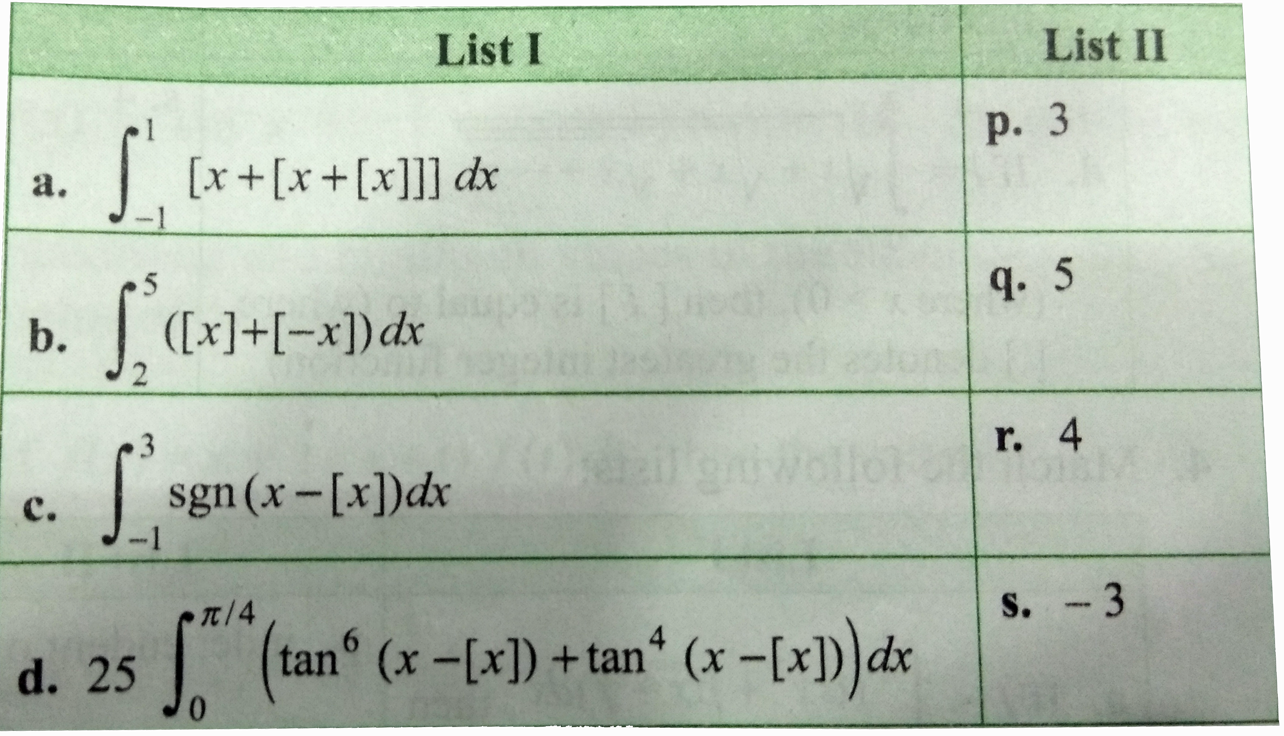If ∫x0{∫u0f(t)dt}du is equal to
(a) ∫x0(x−u)f(u)
(b) ∫x0uf(x−u)du
(c) x∫x0f(u)du
(d) x∫x0uf(u−x)du Solution in Bengali
∫x0(x−u)f(u)du
∫x0uf(x−u)du
x∫x0f(u)du
x∫x0uf(u−x)du
The correct Answer is:A, B
L.H.S =∫x0{∫u0f(t)dt}du
Integrating by parts choose 1 as the second function. Then,
L.H.S={u∫u0f(t)dt}x0−∫x0f(u)udu
=x∫x0f(t)dt−∫x0f(u)udu
=x∫x0f(u)du−∫x0f(u)udu−∫x0f(u)(x−u)du
=R.H.S.
Topper's Solved these Questions
- DEFINITE INTEGRATION BOOK - CENGAGE PUBLICATIONCHAPTER - DEFINITE INTEGRATION EXERCISE - LC_TYPE
31 Videos
- DEFINITE INTEGRATION BOOK - CENGAGE PUBLICATIONCHAPTER - DEFINITE INTEGRATION EXERCISE - MATRIX MATCH_TYPE
6 Videos
- DEFINITE INTEGRATION BOOK - CENGAGE PUBLICATIONCHAPTER - DEFINITE INTEGRATION EXERCISE - SCQ_TYPE
113 Videos
- CURVE TRACINGBOOK - CENGAGE PUBLICATIONCHAPTER - CURVE TRACINGEXERCISE - EXERCISES
24 Videos
- DETERMINANTBOOK - CENGAGE PUBLICATIONCHAPTER - DETERMINANTEXERCISE - Multiple Correct Answer
5 Videos
Similar Questions
y=f(x) satisfies the relation ∫x2f(t)dt=x22+∫2xt2f(t)dt
The range of y=f(x) is (a) [0,∞) (b)R (c)(−∞,0] (d) [−12,12]
View SolutionIf [.] denotes the greatest integer function, then match the following lists:

View SolutionLet f(x)=limn→∞1n((x+1n)2+(x+2n)2+……….+(x+n−1n)2)
Then the minimum value of f(x) is
View SolutionFind the derivative of y=sin2x−cosx
View SolutionIf x∈R,ai,bi,ci∈R for i=1,2,3 and ∣∣ ∣∣a1+b1xa1x+b1c1a2+b2xa2x+b2c2a3+b3xa3x+b3c3∣∣ ∣∣=0, then which of the following may be true ?
View SolutionLet f(u) be a continuous function and for any real number u.let [ul denote the greatest integer less than or equal to u.Show that for any x>1int_(1)^(x)[u]([u]+1)f(u)du=2sum_(i=1)^(x)i int_(i)^(x)f(u)du
View SolutionIf ∫x0{∫u0f(t)dx}du is equal to (a) ∫x0(x−u)f(u) (b) ∫x0uf(x−u)du (c) x∫x0f(u)du (d) x∫x0uf(u−x)du
View SolutionIf f is a continuous function on [a,b] and u(x) and v(x) are differentiable functions of x whose values lie in [a,b] then ddx{∫v(x)u(x)f(t)dt}=f(v(x))dv(x)dx−f(u(x))du(x)dx
View SolutionIf y =f(u) is differentiable function of u, and u=g(x) is a differentiable function of x, then prove that y= f [g(x)] is a differentiable function of x and dydx=dydu×dudx.
View SolutionIf F(x)=∫x1f(t)dt,where f(t)=∫t21√1+u4udu, then the value of F''(2) equals to
View SolutionIf ∫x0{∫u0f(t)dt}du is equal to (a) ∫x0(x−u)f(u) (b) ∫x0uf(x−u)du (c) x∫x0f(u)du (d) x∫x0uf(u−x)du
View Solution∫x0{∫u0f(t)dx} du is equal to (a) ∫x0(x−u)f(u)du (b) ∫x0uf(x−u)du (c) x∫x0f(u)du (d) x∫x0uf(u−x)du
View SolutionIf f is continuous function and F(x)=∫x0((2t+3).∫2tf(u)du) dt, then ∣∣∣F2f(2)∣∣∣ is equal to____ .
View SolutionLet f be continuous and the function g is defined as g(x)=∫x0(t2∫t1f(u)du)dt where f(1)=3. then the value of g'(1)+g''(1) is
View SolutionIf u=f(x3),v=g(x2),f'(x)=cosx, and g'(x)=sinx, then dudv is
View Solutionसिद्ध कीजिए : ∫x0(∫u0f(t)dt)du=∫x0f(u).(x−u)du
View Solution
